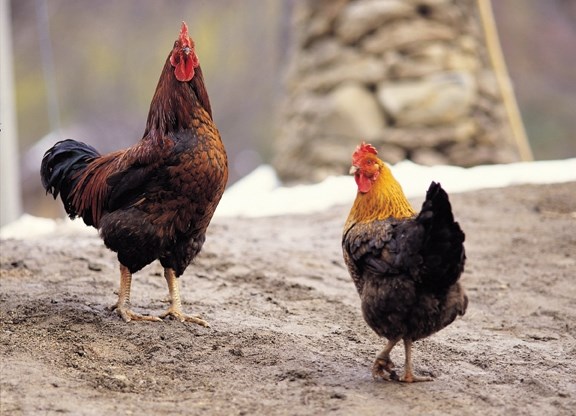West Nipissing council were close to passing the municipality’s long-awaited chicken by-law, but some more concerns came forward, and councillors voted to send the motion back to committee for further discussion.
The plot chickens.
Councillor George Pharand detailed how councillors received a letter from a concerned citizen, “who raised some points that I had not fully considered.” One issue raised was what do to with sick chickens? Specifically, those so far gone that they need to be culled from the flock.
“The proposed by-law bans butchering on people’s properties,” Pharand noted, “but it raises certain questions about what people are supposed to do with sick chickens? I don’t think we can expect people to take it to the local vet and have it euthanized.”
That would be costly and impractical, Pharand continued, “and sometimes I think it’s probably best if you have a sick chicken to cull it on site rather than transport it somewhere else.”
See: Chickens on your mind? West Nipissing wants to know
Work on the chicken by-law began last April. Since then, the municipality has encouraged people’s input, and have had numerous discussions at the council table, hashing out details like how many chickens should be allowed, and the distance between a coop and a fence.
The by-law concerns backyard chickens in urban areas. Within most of West Nipissing, particularly the rural zones, chickens have always been allowed. This by-law is for folks living in town who may want to keep some chickens in the back yard.
As for Pharand’s concerns, he mentioned that within the proposed by-law roosters are forbidden, but if people are hatching chicks, “what do they do with the rooster chicks?” The by-law doesn’t address that.
See: West Nipissing residents getting chicken?
He also explained that as is, “the by-law will effectively ban raising chickens for meat.” The proposed by-law states “no person shall dispose of deceased hens by way of burying, incinerating, composting, or municipal waste pickup.” Pharand questioned “what are people supposed to do with the dead stock?”
Another issue Pharand raised from that letter was what are people supposed to do with the chicken manure? The draft by-law demands “all manure and waste is removed and disposed” from one’s property, but the by-law also says “no person shall dispose of manure on a residential lot, in a watercourse or water body, by composting, or municipal waste pickup.”
Pharand suggested council reevaluate the rules on disposal, because “you can’t use fresh manure on your garden, you’ll burn your plants,” so what are people to do with it?
The Ontario government has guidelines for keeping backyard chickens, “and nowhere in that did I see that you shouldn’t butcher chickens at home.”
See: Council to determine pecking order in backyard chicken decision
Overall, Pharand emphasized that he’s concerned the proposed by-law “will leave people more confused than when we started.”
He suggested “we go back and reconsider” these points within the draft by-law. Council agreed and sent the by-law back to committee for further discussion.
The draft by-law can be read at the municipality’s website.
David Briggs is a Local Journalism Initiative reporter who works out of BayToday, a publication of Village Media. The Local Journalism Initiative is funded by the Government of Canada.

.png;w=120;h=80;mode=crop)

